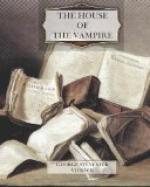II
With elastic step, inhaling the night-air with voluptuous delight, Reginald Clarke made his way down Broadway, lying stretched out before him, bathed in light and pulsating with life.
His world-embracing intellect was powerfully attracted by the Giant City’s motley activities. On the street, as in the salon, his magnetic power compelled recognition, and he stepped through the midst of the crowd as a Circassian blade cleaves water.
After walking a block or two, he suddenly halted before a jeweller’s shop. Arrayed in the window were priceless gems that shone in the glare of electricity, like mystical serpent-eyes—green, pomegranate and water-blue. And as he stood there the dazzling radiance before him was transformed in the prism of his mind into something great and very wonderful that might, some day, be a poem.
Then his attention was diverted by a small group of tiny girls dancing on the sidewalk to the husky strains of an old hurdy-gurdy. He joined the circle of amused spectators, to watch those pink-ribboned bits of femininity swaying airily to and fro in unison with the tune. One especially attracted his notice—a slim olive-coloured girl from a land where it is always spring. Her whole being translated into music, with hair dishevelled and feet hardly touching the ground, the girl suggested an orange-leaf dancing on a sunbeam. The rasping street-organ, perchance, brought to her melodious reminiscences of some flute-playing Savoyard boy, brown-limbed and dark of hair.
For several minutes Reginald Clarke followed with keen delight each delicate curve her graceful limbs described. Then—was it that she grew tired, or that the stranger’s persistent scrutiny embarrassed her?—the music oozed out of her movements. They grew slower, angular, almost clumsy. The look of interest in Clarke’s eyes died, but his whole form quivered, as if the rhythm of the music and the dance had mysteriously entered into his blood.
He continued his stroll, seemingly without aim; in reality he followed, with nervous intensity, the multiform undulations of the populace, swarming through Broadway in either direction. Like the giant whose strength was rekindled every time he touched his mother, the earth, Reginald Clarke seemed to draw fresh vitality from every contact with life.
He turned east along Fourteenth street, where cheap vaudevilles are strung together as glass-pearls on the throat of a wanton. Gaudy bill-boards, drenched in clamorous red, proclaimed the tawdry attractions within. Much to the surprise of the doorkeeper at a particularly evil-looking music hall, Reginald Clarke lingered in the lobby, and finally even bought a ticket that entitled him to enter this sordid wilderness of decollete art. Street-snipes, a few workingmen, dilapidated sportsmen, and women whose ruined youth thick layers of powder and paint, even in this artificial




